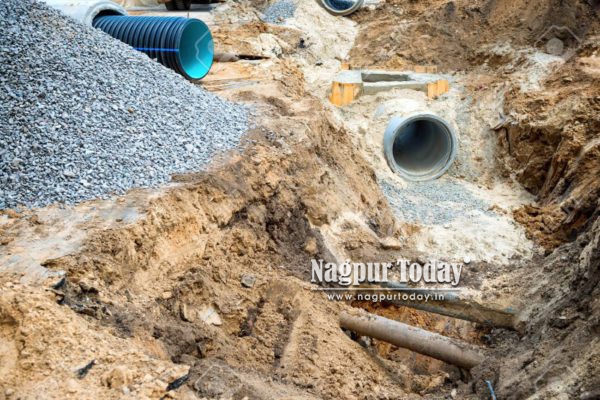
Nagpur: The Nagpur Municipal Corporation (NMC) has embarked on a massive sewage network expansion under the AMRUT 2.0 scheme, with an estimated cost of Rs 957.01 crore. The ambitious project aims to strengthen the city’s sanitation infrastructure by constructing new sewerage collection systems, sewage treatment plants (STPs), and associated works across multiple zones. However, the large-scale excavation required for these developments has resulted in extensive road damage, raising concerns among residents over inadequate restoration efforts.
A multi-crore undertaking with road woes
According to sources, several high-value contracts have been sanctioned under the scheme:
• Package 1: Vishvaraj Environment Private Limited is executing an STP construction project, including SCADA and allied works, at a cost of Rs 92.78 crore.
• Package 2: Laxmi Civil Engineering Services Pvt. Ltd. has been awarded Rs 146.81 crore for setting up a sewage collection system in South Zone SZ-1.
• Package 3: Kalthia Engineering and Construction Ltd. is developing the sewerage system for South Zones SZ-2, SZ-3, and GM at a cost of Rs 220 crore.
• Package 4: P. Das Infrastructure Pvt. Ltd. is handling the sewerage collection system for South Zone SZ-4, GM 4-2, and GM 4-4, with an allocated budget of Rs 99.61 crore.
• Package 5: Laxmi Civil Engineering Services Pvt. Ltd. is also responsible for Hudkeshwar and Narsala’s sewerage system, valued at Rs 130.12 crore.
Residents left frustrated by road damage
The rapid excavation work has left many newly constructed cement roads in disrepair. Chinchbhuvan is among the worst-hit areas, with residents voicing their frustration over the lack of proper road restoration. In Dighori, however, the damage has been somewhat mitigated due to the proactive measures taken by former ward member Pintu Zalke, who ensured proper planning and alternative route arrangements before excavation began.
According to former Chinchbhuvan ward member Avinash Thakre, “The newly laid cement roads have been dismantled for sewage work, but there is no proper restoration. This is causing significant inconvenience to residents and disrupting traffic movement.”
While the sewage network expansion is crucial for improving sanitation in Nagpur, the collateral damage to the city’s roads cannot be ignored. Civic activists and local representatives are calling for immediate action to restore roads, improve coordination between municipal departments, and enforce strict quality checks on infrastructure projects.
Authorities must implement robust road restoration guidelines, conduct quality inspections, and communicate better with the public regarding road work schedules and alternative routes. Unless these concerns are addressed, Nagpur’s developmental strides may come at the cost of public convenience and road safety.














